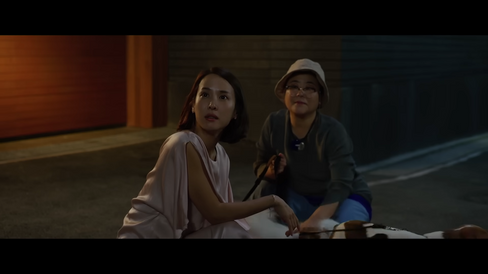Yoon Jung Lee: "Without fair remuneration, there is no future for Korean audiovisual creators"
- Oct 3, 2025
- 4 min read

South Korea has taken the world by storm with its audiovisual productions, yet creators still do not receive fair compensation. Yoon Jung Lee, screenwriter, director, chair of the Author’s Rights Committee of DGK (Directors Guild of Korea) and second vice president of the International Confederation of Audiovisual Authors (AVACI), outlines the challenges and progress in this ongoing fight for recognition.
By Ulises Rodríguez
“Passion pay”: the hidden cost of the Korean audiovisual boom
The global success of South Korean productions is undeniable. Series like Squid Game, films like Parasite, and the unstoppable rise of K-Drama and K-Cinema have positioned South Korea as a creative powerhouse. Yet, according to Yoon Jung Lee—screenwriter, director, and a key figure in the defense of creators' rights—this global boom hides a painful contradiction: audiovisual creators are not being fairly compensated for their work.
“In Korea, there's this idea of ‘passion pay’. The belief is that if you love what you do, you don't need to be fairly paid,” Lee told AV Creators News. Although working conditions for technical crews have improved due to regulations on working hours, creators like directors and screenwriters remain subject to contracts with no time limits or minimum guarantees. “The result is an industry that shines on the surface, but leaves behind those who make it possible.”
Parasite / Squid Game
Yoon Jung Lee and the organization she represents are pushing for a key reform to South Korea’s Author’s Rights Law. Currently, Article 100, Paragraph 1 of the law presumes that the rights to use audiovisual works belong to the producer. This means that creators lose any ability to claim further compensation for the reproduction or exploitation of their works.
“We want to introduce an amendment that recognizes the inalienable right of creators to receive fair remuneration for the use of their works,” says Lee. Although the proposal stalled in the previous National Assembly, they are now working with legal experts on a revised version, which they plan to relaunch after the July presidential elections. “We’re presenting our proposal to the candidates and preparing a mass campaign to raise awareness of this issue.”
Contracts that silence rights
One of the biggest obstacles for Korean creators is the nature of the contracts they sign with production companies and platforms. “Most contracts transfer all usage rights—including those for derivative works,” Lee explains. Unless the creator is considered a producer or co-producer, they lose all rights over their work once the transfer is signed.
This problem has worsened with the arrival of global platforms in Korea, which introduced standardized full buyout contracts. “Some television writers used to receive compensation for reruns, but those rights disappeared with the new content acquisition policies.”
Some industry executives argue that it's not feasible to implement proportional compensation systems due to the complexity of global distribution. Lee strongly disagrees: “That’s simply not true. The digitalization of data makes it easier to track how works are used. The real issue is that creators are excluded from the distribution process and have no access to that information.”
According to Lee, what’s needed is a legal structure that ensures both fair remuneration and access to distribution data. Other countries have already succeeded in doing this—Korea now has the chance to follow their example.
Conditioned creativity: the cost of investor dependence
Under the current system, Korean creators are paid upon signing the contract, as part of the initial investment. This means that compensation is delivered upfront, regardless of the work’s eventual impact or success. “Instead of rewarding quality or audience response, the system rewards the ability to attract investors,” Lee points out.
This model not only discourages creators but also limits creative freedom. “The most daring works come from the creator’s genuine desire—not from investor expectations. If we want a sustainable industry, we must structurally protect that creative drive.”

AVACI and the strength of the international network
As second vice president of AVACI, Lee emphasizes the importance of international cooperation. “Thanks to AVACI, we’ve learned that it’s possible to build a fairer system. The 2022 general assembly in Korea was a turning point for our cause.”
The global network of audiovisual authors has not only provided valuable information but also diplomatic support. “When the Korean government tried to discredit our campaign, colleagues from around the world reached out and offered their backing. That solidarity was decisive.”

Yoon Jung Lee draws inspiration from countries that have gone through crises and still managed to strengthen creators' rights. “The experiences of Argentina and Colombia, which faced industry upheavals and transformations, taught us that a solid system of rights can protect creators through any contingency.”

The COVID-19 pandemic and the rise of streaming platforms tested the resilience of the audiovisual sector worldwide. But in Korea, creators remain unprotected. “Every time a crisis hits, we lose valuable talent. We need a legal framework that prevents that loss.”
Despite the challenges ahead, Lee says: “We are not alone. This is not a fight we can win in isolation. Learning, sharing what we've learned, and speaking up with courage is enough. That’s what keeps us going.”
The story of Yoon Jung Lee and Korean audiovisual creators is the story of an industry in full bloom that still owes justice to its authors. Their fight, rooted in passion but guided by reason, is an urgent call to recognize that without authors, there is no future for the audiovisual world.
















Comments